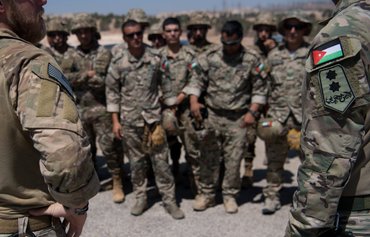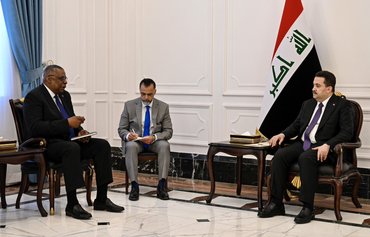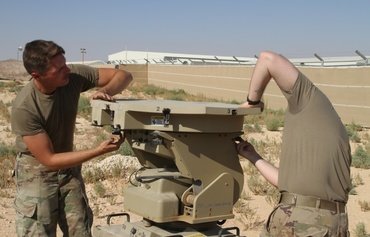Reflective of its central status in the region over the past few decades, Jordan continues to be a vital nation to the security and stability of the Middle East, as evidenced by a number of recent visits by top US military officials and ongoing joint military exercises between the two countries.
Most recently, the leader of US Central Command (CENTCOM) Gen. Michael "Erik" Kurilla visited Jordan on April 25 and 26, meeting with Jordanian King Abdullah and top Jordanian military officials.
"The leaders discussed continued co-operation between the United States and Jordan, modernisation of shared technologies, and opportunities to strengthen interoperability," read a CENTCOM statement on April 26.
Kurilla later spent time with Abdullah, discussing pressing threats to the security and stability of the region and opportunities to enhance security co-operation between the two countries.
![Jordanian King Abdullah meets with US Secretary of Defence Lloyd Austin in Amman on March 5. [The Royal Hashemite Court of Jordan]](/cnmi_am/images/2023/05/03/41758-austin-abdullah-meeting-600_384.jpg)
Jordanian King Abdullah meets with US Secretary of Defence Lloyd Austin in Amman on March 5. [The Royal Hashemite Court of Jordan]
![Members of the US Defence Threat Reduction Agency and the Jordanian armed forces participate in the Jordan Shield 2023 exercise in a photo posted to Twitter on April 5. [Defence Threat Reduction Agency]](/cnmi_am/images/2023/05/03/41761-jordan-shield-drill-600_384.jpg)
Members of the US Defence Threat Reduction Agency and the Jordanian armed forces participate in the Jordan Shield 2023 exercise in a photo posted to Twitter on April 5. [Defence Threat Reduction Agency]
"Our enduring military partnership with the Jordanian Armed Forces is important to regional stability and protecting mutual interests," Kurilla said.
"Jordan is critical to the security and stability of the region," he said. "The strategic importance of the Jordanian Armed Forces was made clear during the battle against ISIS [Islamic State of Iraq and Syria]."
Kurilla described the Jordanian Armed Forces as "a bulwark for regional peace and stability".
These sentiments were echoed earlier when US Secretary of Defence Lloyd Austin chose to kick off his recent Middle East tour in the Jordanian capital, highlighting historically close ties with the long-term US ally and the kingdom's critical role as a stabilising force in the region.
The tour, which also took Austin to Israel and Egypt, came amid heightened tensions with Iran and renewed violence in Jerusalem and the West Bank.
During a March 5 meeting, Austin and Abdullah discussed regional security co-operation and ways to strengthen the bilateral relationship.
Austin reaffirmed the US commitment to Jordan's security and to the security and stability of the region, and thanked Abdullah for his leadership.
He shared his concerns on shared challenges including the need to reach a just political solution in Syria, focus on security and stability in Iraq and counter other destabilising activities in the region, the Pentagon said.
Austin also expressed gratitude to the Jordanian monarch for hosting a February 26 meeting in Aqaba that yielded "comprehensive and frank discussions" among Jordanian, Egyptian, Israeli, Palestinian and US senior officials.
The Aqaba meeting -- the first of its kind in years -- was followed by another meeting on March 19 that sought to pave a way forward towards a peaceful settlement between the Israelis and the Palestinians.
Austin's visit was intended to assure Jordan that the United States remains a deeply committed partner to the kingdom and other Middle Eastern allies and is "here for the long term".
"We are going to be by their side going forward, no matter what," Austin said, stressing that these partnerships, formed and nurtured over decades, "have, in fact, created greater stability".
He also reaffirmed the US intention to deepen economic and military co-operation with Jordan, underpinned by the seven-year, $10.15 billion US-Jordan Memorandum of Understanding.
He applauded the professionalism of the Jordanian Armed Forces and expressed his appreciation of US-Jordanian military co-operation and gratitude for Jordan's contributions to regional security co-operation.
Counter-terrorism co-operation
The United States "deeply values its long history of co-operation and friendship with Jordan, with which it established diplomatic relations in 1949", the US State Department noted in an April 27, 2022, fact sheet on Jordan.
"The United States appreciates the leadership role that Jordan plays in advancing peace and moderation in the region," it said.
Jordan has worked hard to promote a message of tolerance, notably with the Amman Message of 2004, a widely publicised initiative spearheaded by Abdullah that sought to clarify the true nature of Islam.
It has been a regional leader of the international coalition against ISIS, and has continued to work to eliminate the group's remnants and its destructive ideology.
Jordan also is a member of the Saudi-led Arab coalition formed in 2015 to support Yemen's legitimate government against the Houthis, and has hosted mediation efforts that aimed to pave the way for a ceasefire and resolution to the Yemen war.
In February 2019, the United States and Jordan held the first Aqaba Process Tech Meeting to counter terrorism online, which included governments, technology companies, international organisations, civil society and academics.
A follow-up meeting in Amman in June the same year likewise focused on countering terrorist use of the internet, according to the 2019 US State Department Bureau of Counterterrorism country report on Jordan.
And at the United Nations in September 2019, Jordan co-sponsored with New Zealand and France the high-level "Leaders Dialogue: Strategic Responses to Terrorist and Violent Extremist Narratives".
Jordan Shield 2023
In mid March, US military personnel took part in "Jordan Shield 2023", a Jordanian-led exercise that demonstrated responses to simulated complex chemical, biological, radiological and nuclear (CBRN) threat scenarios.
Participants demonstrated standard procedures to contain such threats and deal with their impact according to best practices, the Jordan Times reported.
The drill was the first of its kind at the Jordanian state level, with crisis scenarios unfolding simultaneously in Amman, Irbid, Zarqa and Aqaba that required real-time, joint responses from all participants.
One scenario involved a terrorist attack that resulted in a pipeline explosion spreading ammonia among the local population.
The exercise was conducted by Jordan's National Centre for Security and Crisis Management, the Jordan Armed Forces-Arab Army, security agencies and a number of public and private institutions.
It was implemented jointly with the US Defence Threat Reduction Agency (DTRA), Colorado National Guard and the US embassy in Amman.
Exercises like Jordan Shield are important, organisers said, not just for the training and practice they provide but because of the kingdom's location at the heart of the region.
"We want to make Jordan the hub for this region and we now have expertise in this field, so the security of this region also is the security of the global population," Jordanian Col. Fadi al-Fshikat said in a DTRA account of the drill.

![US and Jordanian military personnel conduct joint training exercises in Jordan. [CENTCOM]](/cnmi_am/images/2023/05/03/41875-civqujwu4aelw3g-600_384.jpg)






